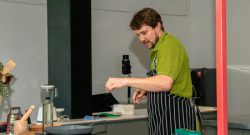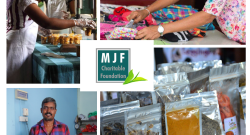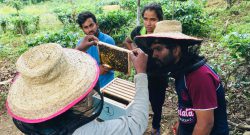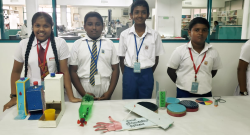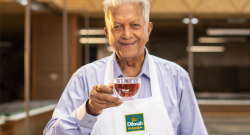Author: Admin
Genesis: Dilmah Centre for A Sustainable Future
An Agri Innovation Hub fostering collaboration, growth, and development for local SMEs and agri tech companies No. 52, Maligawatte Road, Colombo 10, was the birthplace of Dilmah Tea where our Founder Merrill J. Fernando created the first tea-producer-owned tea brand defying the norms of the then commoditized tea industry to focus on tea that was unblended and packed at source. This historic building has now been transformed into a hub for agri-entrepreneurs to also realise their dreams of creating a global brand. Genesis will be dedicated to sustainable agri entrepreneurship and innovation and Nature-base solutions (NBs). The initiative is positioned as a ready commitment to bridge the existing gap between new Sri Lankan agri and food innovations and their marketability and readiness for export, thus allowing local agripreneurs to soar. The Genesis Project Hub (TGP) will operate as an incubator to facilitate ideation, innovation, collaboration, growth and development of likeminded agripreneurs inclined towards Nature-based Solutions (NbS) and restorative agriculture. Nature-based solutions are actions inspired by nature that meet social and economic needs in a way that minimizes its impact on the environment and ecosystems through sustainable management or restoration of the same. Thereby when applied to the food and agri sector, Nbs will empower SMEs in the food and agri sector to become climate resilient, reduce social and economic impacts of climate change on society and validate SMEs as guardians of the environment – smallholder farmers and SMEs are more environmentally sustainable. The TGP community will link international experts in fields of agriculture, food innovation, gastronomy, marketing, product development and technology to achieve the fullest potential for their business or brand to local entrepreneurs. They will have opportunities for development and growth through capacity building, knowledge dissemination, product development, marketing and branding, networking and matchmaking. The physical space has been designed with this in mind and consists of a town hall, digital library, co-working space, boardroom and a fully equipped kitchen. Dilmah Tea, a product of nature, with an undeniable connection to nature and people; the Founder of the company has strengthened that connection by extending his business ecosystem beyond profit to make Dilmah a matter of human service. Among such efforts has been the Small Entrepreneurship Program of Dilmah Tea’s philanthropic arm The Merrill J Fernando Foundation. This has supported over 2000 entrepreneurs since 2005. The Dilmah Genesis project will adopt the model of Dilmah SEPs to support & prioritise Nature based Enterprises, setting it up as the next phase of SEPs. From recognising and mentoring innovators through platforms such as Ecovation Awards to encouraging suppliers to improve sustainability for their products and services through closed loop collaborations, Dilmah is invested in improving sustainability along the value chain for all its stakeholders. Dilmah Tea is committed to social justice and environmental conservation through its philanthropic arm The Merrill J. Fernando Foundation and its environmental sustainability arm Dilmah Conservation. Dilmah believes in the co-existence of human, environment, and wildlife. The design of its conservation projects in areas of green restoration, climate change adaptation and species conservation have always strived to benefit people while protecting nature and wildlife.
A Cup of Kindness Goes A Long Way
As the 1990 Suwa Seriya ambulance service has run into a Rs.1.5 billion shortfall in funds this year, a number of leading corporates have stepped up to fill the void by committing Rs.525 million up to now, to maintain the operations of the critical service uninterpreted. In light of the funding shortfall from the government, due to the economic crisis, the board of directors and management of the Suwa Seriya ambulance service recently introduced the ‘Adopt an Ambulance’ initiative to raise funds from the private sector to maintain the operations intact, with the facilitation of the Ceylon Chamber of Commerce. “We thought of launching this initiative to raise the shortfall, instead of burdening the government or shutting down the number of ambulances that we operate,” 1990 Suwa Seriya ambulance service Chairman Dumindra Ratnayaka told reporters in Colombo this week. Accordingly, a number of top corporates have come forward in committing Rs.525 million in funds so far, adopting 105 ambulances. “It’s just amazing. It is also an endorsement that we, at 1990, are doing it right. It is also an encouragement to continue to do what we do at our best,” Ratnayake said. By pledging a Rs.5 million per one 1990 ambulance per annum to support the maintenance cost of the valuable service, the private sector has ensured the continuity of emergency medical care to the public. Ratnayaka was optimistic of meeting the balance Rs.1 billion shortfall in funds through the private sector for the year. Further, he noted that the initiative would extend to next year, if the funding shortfalls continue to arise. The service operates a fleet of 297 ambulances equipped with the necessary emergency medical equipment and staffed by trained personnel. The maintenance funding allows the ambulance service to operate its full fleet by conducting vehicle and medical equipment maintenance, staff uniforms and safety gear upkeep and conducting continuous training to the staff. The Suwa Seriya ambulance service was launched in 2016 as a donation from the Indian government. It was then regularised as a government service through Suwa Seriya Act No 18 of 2018. Since then, it has built up a national service footprint and handled over 1.4 million emergencies. Over 1000 calls are attended to daily, making it an essential lifeline for patients islandwide.
Dilmah MJF Foundation Small Entrepreneur Programme (SEP)
Empowering Lives, Encouraging Entrepreneurship At the MJF Charitable Foundation, we’re all about making dreams come true! Our Small Entrepreneur Programme (SEP) started as a ray of hope for communities devastated by the 2004 tsunami. Today, we’re proud to say that SEP has spread its wings across Sri Lanka, empowering over 2000 amazing men and women with skills, knowledge, and resources for a brighter future. We’re not stopping there! Our recent SEP grants programme at our Kalkudah Centre was a game-changer. Early this year, we provided grants and support for agriculture, tailoring, farming, and many more entrepreneurial pursuits to 38 brave individuals from the East Coast of Sri Lanka. Because making you a better tea, means the world to us!
Breaking Barriers and Achieving Dreams!
At 23, Sewwandi’s journey is nothing short of inspiring. Born without a leg, she defied all odds and reached remarkable heights in life. Her mantra? “Education is the key to achieving your dreams, despite your differences. We are not special; we are the same. We all have needs, goals, and ambitions, just like everyone else”. Born and bred in Rathnapura, Sri Lanka, Sewwandi successfully passed her G.C.E. Ordinary Level Exams and Advanced Level Exams with flying colours and entered the University of Sri Jayawardanepura. Today she is a proud 2nd-year undergraduate, pursuing her dreams with unwavering passion and truly inspiring everyone around her. As a part of our collaboration with the Colombo Friend in Need Society (CFINS), the Dilmah MJF Foundation has been supporting courageous children just like Sewwandi since 2017, with our Education Grants programme to help them and their families monthly, supporting their expenses for education. In its latest extension, with the help of your cup of kindness, this year, we have been able to empower 56 school children and 4 university undergraduates from across the island, who have limb deficiencies, to achieve their dreams. Watch the video to learn more about our Small Entrepreneur Grants Programme with CFINS.
Dilmah unveils Supply Chain Sustainability Road Map
Dilmah Tea recently invited its supply chain to the heart of its operations in Peliyagoda for an evening of discourse and exchange about sustainability practices and strategies with aspects to product, packaging, the environment, humanity, legal concerns, and so on. Dilmah’s purpose has always been and continues to transcend its quest for quality and business profitability for initiatives aimed at making a better tea for people and the planet, the company said in a media release. A family business, founded on strong values and ethics such as integrity, the tea company strives to instill the very same amongst its stakeholders by creating avenues for visibility and points of engagement The result is a one-of-a-kind long-term sustainability initiative aimed at facilitating a sustainable supply chain. The comprehensive MJF Group’s Supply Code of Conduct is a guide that lays out policies and codes, procurement best practices, supplier engagement, and verification, and disclosure protocols. The statement said Dilmah Tea has maintained its commitment to safeguarding natural and cultural ecosystems and developing interventions for a better society long before sustainability became a core business strategy. These aspects are driven through Dilmah Tea’s environmental sustainability and conservation arm Dilmah Conservation and the Humanitarian arm known as MJF Charitable Foundation, respectively. A fully sustainable supply chain is one that ensures socially responsible business practices. Dilmah has integrated the above-mentioned principles into its corporate strategies, culture, and day-to-day operations to enforce sustainable practices. It also continuously monitors the enforced practices through continuous training, assessments, and supplier feedback to further strengthen its commitment to the aforementioned. Through this path, Dilmah has succeeded in maintaining its presence in 108 countries through an everchanging socio-economic landscape. Further, the Dilmah code of conduct recognises its suppliers’ efforts of adhering to Dilmah standards. A mechanism to approve the supplier as an MJF-verified supplier has been developed in tribute to Dilmah Tea founder Merrill J. Fernando by his son, Dilhan C. Fernando.
Conserving Bees through education, research and livelihood upliftment
Useful for sustainable agriculture and upholding ecosystem services, bees are an important link to biodiversity and human well being. But, the widespread use of pesticides and fertilizer, habitat destruction, and climate change threaten the future of bees and other pollinators and insects. Therefore, pollinator-friendly actions from government policy down to individual action are important. Begun in 2020, Dilmah Tea’s Bee A Keeper Project driven through its conservation and environmental sustainability arm Dilmah Conservation. Here the aim is to conserve Sri Lankan honeybee population through research, education, community involvement and economic upliftment while researching innovating tools such as payment for ecosystems in corporate environmental projects. Bee A Keeper Program Aiming to increase the biodiversity in the tea gardens and bolster biodiversity research, Bee A Keeper Program falls under the conservation and sustainability arm of Dilmah Tea that has several centres in Sri Lanka committed to creating a better tea for people and planet. Bee A Keeper, having several trajectories such as bee research and community beekeeping are each carried out at a designated centre. Bee Research At the Climate Change Centre in Nawalapitiya, dedicated for climate research, the focus is on bee research. Endana Centre whose flagship project is building a nature corridor, adopts community sustainable beekeeping to involve the community in conserving their home gardens and the neighbouring forest. Incidentally, th cumulative ecological wealth of the Endana Nature Corridor is at USD 382,362. Both Endana and the Nawalapitiya centres conduct beekeeping training workshops for the community and other interested parties. Bee Education Education and awareness are important for the success of conserving bees. Dr Anura Indrajith Sirisena Entomologist at the Rajarata University of Sri Lanka and chief advisor for the Bee a Keeper project said, “In community beekeeping we are interested in getting the involvement of the farmers. Through this they come to realize the importance of bees and why we need to conserve them. Further they learn sustainable techniques needed to conserve bees.” During the pandemic (2021), Dr Sirisena curated and delivered a webinar series “Friendly Beekeeper” organized by Dilmah Conservation to introduce beekeeping. With over 300 participants registering, the series was a success. The recorded sessions of Friendly Beekeeper are found on the Dilmah Tea YouTube channel. Among the research focus of the program some of the interest areas have been monitoring bee decline, addressing the lack of taxonomic information on bees, assessing the economic value and impact apiculture, evaluating the status of wild bee populations, and studying the chemistry of honey variants. Apitourism The future plan is to increase its volume of training programs for locals in the area and for the hospitality sector that can benefit from apitourism. An extension of ecotourism, apitourism ranges from site tours, tasting experiences to safely engaging in beekeeping. It is one of the aims of the project to make sustainable beekeeping popular in Sri Lankan ecotourism niche thereby indirectly strengthening sustainable beekeeping. Dilmah was founded on the knowledge of its enduring connection to the land and the surrounding communities in which it operates. Dilmah Conservation is a symbol of Dilmah’s comprehensive commitment to minimizing its impact on the planet, to fostering respect for the environment and ensuring its protection by encouraging a harmonious co-existence of man and nature and the sustainable use of the environment.
MJF Kids’ Science Exhibition – 2023
MJF Kids Programme Our MJF Kids from the Peliyagoda, Weragodella, and Maligawatte Centres, rocked their mini science exhibition, proudly showcasing the wonders of their classroom experiments, last week. Our teams from the Home of Dilmah immersed themselves in the MJF Kids’ inventions, offering encouragement and admiration during their visit. The MJF Kids Programme in Peliyagoda is one of the oldest initiatives led by the MJF Foundation. Dilmah Founder Merrill J. Fernando was always passionate about supporting underprivileged children in the area with education, enhancing their creative skills, and holistic development. Click to learn more about our MJF Kids Programme
Our Founder’s Story
In the serene coastal town of Pallansena, Negombo, a boy was born to two hardworking Ayurvedic doctors in 1930. Little did they know that their son, Merrill J. Fernando, would one day become the ‘World’s Most Experienced Teamaker’, serving flavourful brews made with the finest two leaves & a bud, handpicked, perfected and packed amidst the rolling hills of Ceylon.Although the name Dilmah came into existence later, the story of Merrill J. Fernando and his passion for tea began in his early twenties when he began his career at AF Jones. When the British Colonial system was still prevailing, it was believed that Sri Lankans could not taste tea because they ate too much curry. Merrill J. Fernando proved this theory wrong when he was selected as one of the first ever Sri Lankan tea tasters to learn about tea in Mincing Lane, London.He travelled to England with Joseph Travers & Sons in 1954 to learn more about the tea industry. After a year of hard work and dedication, he was appointed director of AF Jones in 1958. He went on to buy the company with his two partners when the owners decided to return to England. In the following years, his life was enriched by the arrival of his two sons, Malik and Dilhan, while the company he built, MJF Co Ltd, made its highest net profit for tea sold.The road ahead looked bright, and Ceylon Tea Services Ltd was established in 1982.In 1985, Merrill J. Fernando renamed his tea company to the now globally recognized brand name, Dilmah, in honour of his sons Dilhan and Malik. With unprecedented success in Sri Lanka, his vision was to share the unparalleled taste of Ceylon tea with the world. This led to the launch of Dilmah in Australia in the following years, accompanied by a legendary campaign featuring the iconic line “Do try it,” which helped cement Merrill J. Fernando and his Dilmah as a household name.The rest, as they say, is history, still in the making, because the Dilmah story never stops brewing… 2nd Generation- Dilhan C Fernando and Malik J Fernando. Stewarding the legacy of the World’s First Producer-Owned Tea brand are the 2nd Generation of Dilmah, sons Dilhan C. Fernando, and Malik J. Fernando, along with the 3rd Generation’s Amrit M. J. Fernando. Dilhan, as Tea Grower & Dilmah CEO, has embarked on a journey to uphold the values of quality, authenticity and integrity instilled by our Founder. Despite the challenges of the times, with ever-evolving global trends, economic crises, global pandemics, he continues to steer Dilmah in the right direction, never compromising on quality and consistently respecting Nature’s Luxury, our Most Versatile Herb, the World’s Finest Single Origin Pure Ceylon Tea. Malik, with a keen to elevate our Resplendent Isle of Ceylon, continues to support Dilhan with Dilmah whilst also crafting a luxury chain of Relais & Châteaux properties across Sri Lanka under his Resplendent Ceylon brand. Combining his passion for hospitality and tea, the luxury resorts 7 villas continue to create unforgettable experiences for guests while promoting Sri Lanka’s rich cultural heritage and tea industry.The 3rd Generation of Dilmah continues to share in the passion with which Founder Merrill J. Fernando created his brand. Amrit M.J. Fernando spends his days at the Home of Dilmah, immersing himself in the art of the Teamaker, partaking in the tasting of over 10,000 cuppas a week, in order to perfect his grandfather’s and father’s craft. He plays a strong role in the evolution of Dilmah through innovation and improving on sustainability, because making you a better tea means the world to us!

